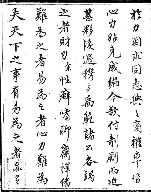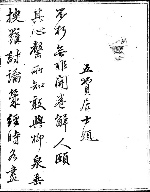NEW SCHOLARSHIP
Selected Stories Translated from Liaozhai zhiyi | China Heritage Quarterly
The Manchu Preface to Jakdan's Selected Stories Translated from Liaozhai zhiyi
Translated by:
Mark Elliott, Harvard University, Cambridge
Elena Chiu, University of Massachusetts, Amherst
Pu Songling (1640-1715) spent a lifetime in provincial Shandong. From the age of nineteen until a few short years before his death he repeatedly attempted to achieve success in the imperial civil service examinations. A perpetual student who eked out a living as a lowly secretary, his spent the long years of obscurity composing an extraordinary collection of stories, anecdotes and tales, the Liaozhai zhiyi 聊齋志異. A selection of the stories was translated by Herbert Giles and published under the title Strange Tales from a Chinese Studio in 1880. It is a work that was much reprinted and enjoyed by generations of students of China as well as a broad general readership. However, as a later and more audacious translator remarks, it was a work that 'certainly reveals the limitations of the taste of his time'. (For more on this subject, see John Minford and Tong Man, 'Whose Strange Stories? P'u Sung-ling (1640-1715), Herbert Giles (1845-1935), and the Liao-chai chih-yi', East Asian History, Issue No.17/18, June/December 1999.)
John Minford's Strange Tales from a Chinese Studio, Penguin, 2006, is a modern and accessible translation of 104 of the most intriguing tales. A Manchu translation of 128 stories from Pu Songling's collection was made by Jakdan and this bilingual work appeared under the title Liyoo jai jy i bithei šutucin (known in Chinese as Man-Han hebi Liaozhai zhiyi 滿漢合璧聊齋志異) in 1848, during the late Daoguang reign. The following is a translation of Jakdan's Manchu preface to that selection, followed by a short piece in Chinese from his hand.—The Editor
The translator, Jakdan (Zha-ke-dan 扎克丹) (zi Xiufeng 秀峰, hao Wufei jushi 五費居士), was a Manchu of the Plain Red Banner and an 1826 metropolitan graduate (jinshi) in translation. We do not know his exact dates, but in another preface to the 1848 Liaozhai translations, it is stated that he was 70 sui at the time making it likely that he was born sometime ca.1780, near the end of the Qianlong reign. Apart from his translations of Pu Songling, Jakdan authored other translations and original works, none of which appear to have been published. The manuscript of one such text, a collection of poems in eight juan titled Jabduha ucuri amtangga baita ('Tasty reads for your spare time'), was recently discovered in the collection of the Harvard-Yenching Library. Seven fascicles of this ms. are translations from the Chinese, written in parallel, but the eighth consists of Jakdan's own poems, in Manchu only. (See James Bosson and Hoong Teik Toh, 'Jakdan and His Manchu Poetry', in Stephen Wadley, ed., Proceedings of the First North American Conference on Manchu Studies, vol. 1, Studies in Manchu Literature and History, Wiesbaden: Harrassowitz, 2006, pp.13-25; and, Zhuo Hongze 桌鴻澤 [Hoong Teik Toh], 'Xin faxian Zha-ke-dan Man-Han hunhe shige ershou' 新發現扎克丹 滿漢混合詩歌二首, Manyu yanjiu 滿語研究, 2005.1.)—Mark Elliott
The Manchu language is our people’s native tongue. In form, it matched yin and yang; its sounds thoroughly harmonized the major and minor tones. Since then [i.e., the creation of the Manchu script], important scholars have continuously emerged and made to translate the imperial editions of the Four Books, the Five Classics, and other such books of guiding principles and profound mirrors, all for the edification of later people. Marvelous writings appeared, of a sort not seen in a thousand generations. My, how lofty they are!
As for stupid me, due to my dull-wittedness, I have not read all the classics and histories. Nor have I grasped the skill of writing poetry and verse. Because my family was poor, when I was a young man, I studied Manchu for a little while, thinking only of getting some kind of government job. Unexpectedly, I passed the translation examination at the provincial level and then also at the metropolitan level.
When I was not at work, though I browsed through many different kinds of books, I was especially fond of reading Liaozhai zhiyi. Why, you may ask. This work takes Sima Qian’s thought as a model and esteems the morals in the Spring and Autumn Annals; it enlightens each new generation as it emerges; it surprises people; it corrects errors; it propagates goodness. In a joking and playful way, moral instruction is embedded in its words, providing both encouragement and admonition. Truly, there is much value in its philosophical teachings. I said to myself: ‘If I were to translate this book’s wonderful lessons and hidden truths into Manchu, the best parts [of the works] created by previous scholars might be elucidated more fully.’ For a long time I thought this, and yet I dared not pick up a writing brush.
Later, I obtained and read Huashen [The Flower Spirit] and four other pieces translated by the late Mr. Ming Youpu. Truly, it is quite astonishing how the ideas conveyed there suit the form so perfectly. At this point, my literary desires were greatly stimulated. Disregarding my superficial learning and the ridicule of others, in the year of the red dog [bingxu, 1826], when I had the official post of a secretary of the Board of Works at Mukden, [I began]. Every night, when the flowers bloomed in the bright moonlight, I picked up a volume and chose a chapter that was easy to understand and translated; thus the days passed, one by one. When I had accumulated many completed sections, I asked several teachers and friends for their corrections. Nevertheless, I am afraid that I have not done my best. I can only hope that erudite officials and scholars will read it, leave what is good alone and fix what is wrong. It would surely be a happy thing for Manchus of talent if like-minded people all acted together to make it totally flawless. Therefore, I have written this preface.
Written by Wufei jushi on an auspicious day of the first month of the twentieth-eight year of the Daoguang reign [1848].
A Transliteration of Jakdan's Preface
Sonjofi ubaliyambuha liyoo jai jy i bithei šutucin
manju bithe serengge musei gurun i tesu ba i gisun. tuttu seme terei dursun oci. e a de acanahabi. terei mudan oci alioi elioi de hafunahabi. tereci ebsi. dalaha baksi siran siran i tucifi. hesei duin bithe. sunja nomun hešen hergin mumin buleku i jergi bithe be aname ubaliyambubufi. amaga niyalma be neileme ulhibure jakade. minggan jalan i umai sabuhakū ferguwecuke bithe deribuhebi.. aya. absi wesihun biheni.. mentuhun bi oci. banitai mufuyen ofi. nomun suduri be bireme hūlahakū. irgebun fujurun be banjibume bahanarakū bime. boo yadahūn se ciksin seme. taka manju bithe tacifi alban kame yabure be bodoro dabala. gūnihakū ubaliyambure tukiyesi simneme dosifi. geli ubaliyambure dosikasi simneme dosika yamun ci facafi. geren bithe be aname tuwacibe ele liyoo jai jy i bithe be buyeme tuwambi. adarame seci. tere bithe. sy ma ciyan i gūnin be alhūdafi šajingga nomun i jurgan be gaifi. yaya badarambume tucibuhe jalan be ulhibure. niyalma be sesulabure. endebuku be halabure. sain de gurinjebure. yobo maktara doroi jorire jergi gisun de gemu huwekiyebure isebure doro baktambuha be dahame yargiyan i gebu tacihiyan de gungge bihengge kai.. mentuhun mini dolo ere bithei ferguwecuke jorin somishūn giyan be manju gisun i ubaliyambuci. nenehe bithei saisai deribume banjibuha sain ba ele iletuleme tucinjire be boljoci ojorakū seme gūnime goidacibe. kemuni gelhun akū fi nikebure unde.. amala nenehe baksi ming io pu siyan šeng ni ubaliyambuha hūwa šen sere jergi duin meyen be baime bahafi tuwaci. yala arbun ci tulgiyen gūnin be ulafi erei dorgi ferguwecuke de lak seme acanahabi. ede šu gūnin ler seme deribufi beyei taciha bengsen i micihiyan cinggiya weri i weihe niombi sere basucun be wei guwanta seme fulgiyan indahūn aniya mukden weilere jurgan i ejeku hafani i tušan de ilha ilaka biya eldeke ucuri teisulebuhe dari. emu debtelin gaifi tuwame ja i ulhirengge be sonjofi ubaliyambume inenggi aname genehei. utala meyen iktame jabdufi udu sefu gucu de baihanafi tuwancihiyabuha bicibe. hono sain be akūmbuhakū ayoo seme olhombi damu buyerengge ambula taciha ambasa saisa tuwafi uru babe bibufi. jaka babe tuwancihiyafi heni icihi cilcin akū obufi gese sasa amuran ursei emgi uhelere ohode inu manju erdemungge niyalmai emu selacuka baita ombidere.. uttu ofi šutucin araha
Doro eldengge i orin jakūci aniya aniya biyai sain inenggi u fei gioi ši araha
The Title Page and Manchu Preface to Jakdan's Translation
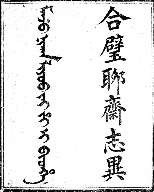
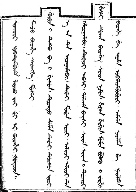
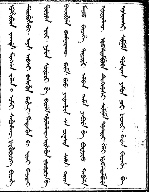
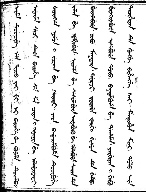
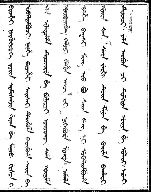
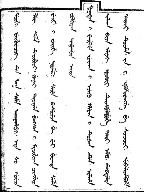
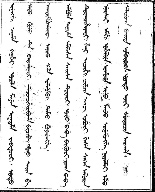
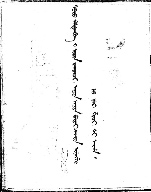
Jakdan's (Wufei jushi) Chinese Preface
